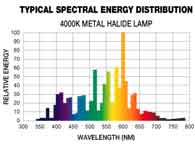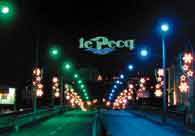| |
Correlated
Color Temperature (CCT)
The
first factor in choosing a lamp color is the correlated color temperature.
For example, if a retailer wants lighting to blend in with warm
halogen accent lamps, the retailer may choose a Venture® MP
100W/C/U/3K, which has a correlated color temperature of 3200K.
CCT is defined as the absolute temperature (expressed in degrees
Kelvin) of a theoretical black body whose chromaticity most nearly
resembles that of the light source. The CCT rating is an indication
of how "warm" or "cool" the light source appears.
The higher the number, the cooler the lamp color will appear. The
lower the number, the warmer the lamp color will appear.
Spectral
Energy Distribution
When we
look at a light source, the eye "perceives" a single color.
In reality, we are seeing literally thousands of colors and hues
made up of a combination of different wavelengths of light. These
different combinations and the relative intensity of various wavelengths
of light are used to determine the CRI of a light source.

back
to top
|
|
Color Rendering
Index (CRI or Ra)
In general,
CRI is a numeric indication of a lamp’s ability to render individual
colors accurately relative to a standard. The CRI value is derived
from a comparison of the lamp’s spectral distribution to the
standard (e.g. a black body or the daytime sky) at the same color
temperature.
Color Shift
and Variation
Different
colors are produced in metal halide lamps by using various arc tube
shapes and metal halide salts. In new lamps these halides need to
"burn-in" for approximately 100 hours before they reach
their optimum color. This is why new lamps can sometimes be unstable
or vary in color.
As metal halide
lamps age, chemical changes occur causing shifts in color. Generally,
traditional probe start lamps shift approximately twice as much
in CCT over life compared to Uni-Form® pulse start lamps.
Special Colors:
Designer
Color® lamps that produce blue, green, aqua and pink light are
available for special applications where color is needed without
light loss due to filters.

back
to top
|
|
Different
Colors
Venture
Lighting offers lamps in many colors to suit virtually any lighting
application. Outlined below are the various color temperatures (CCT)
currently available:
27K 2700K
- Used as a replacement for very warm incandescent lamps (coated
only).
3K 3000K-3200K
- Used as a general warm, white light source, available in clear
or
coated finish
for retail or interior applications; blends with halogen lamps.
4K 3700K-4000K
- Used as a neutral white light source, available in clear or
coated finish for general lighting, factories, parking lots, warehouses.
5K 5000K
- A moderately high CCT daylight source used in general and
retail lighting applications
6K 6500K
- A high CCT daylight source used to simulate average outdoor
light conditions
10K 10,000K
- A very high CCT, daylight light source, used in horticulture
and aquarium applications.
back
to top
|
|

